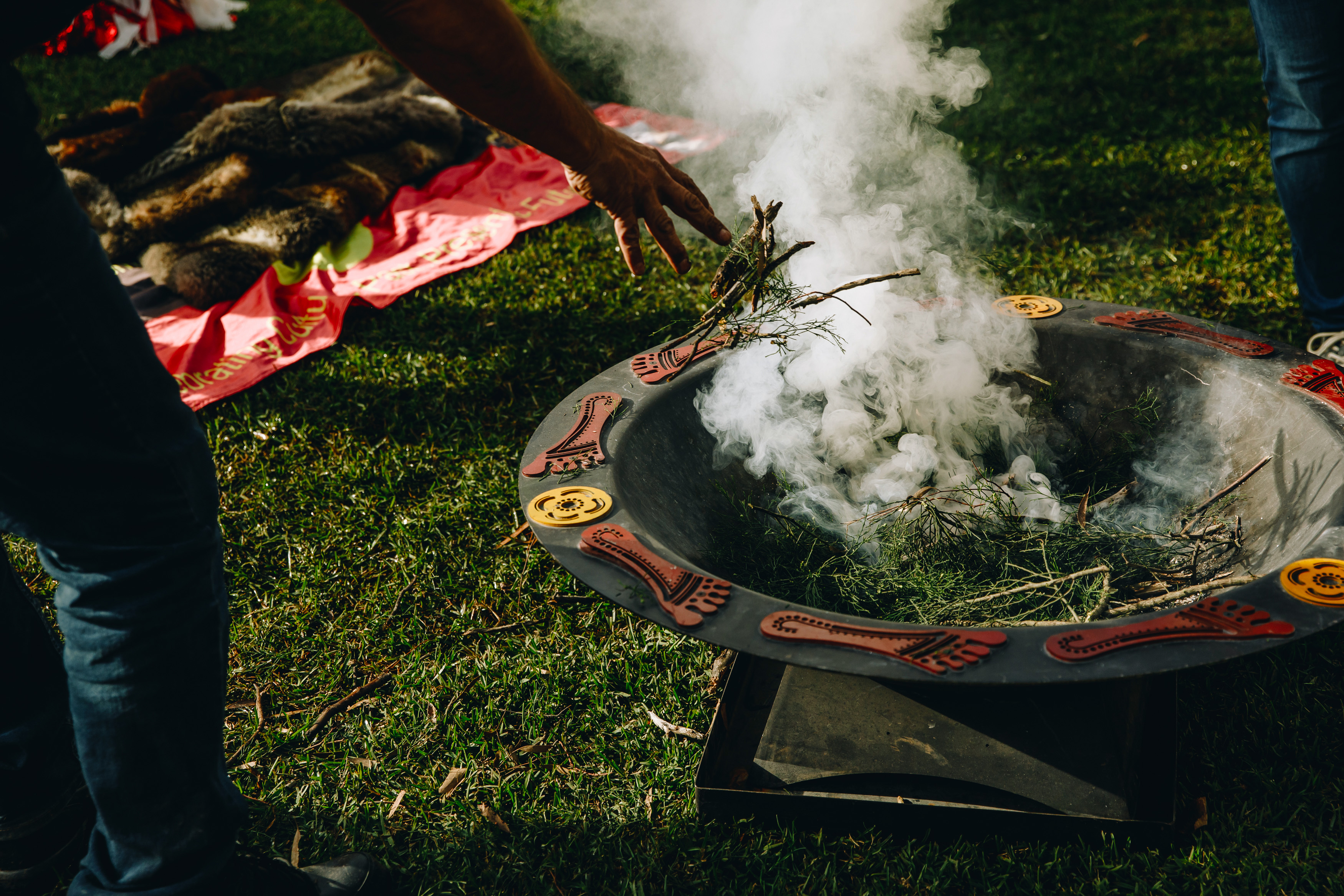
National Centre for Reconciliation Practice
Leading national academic, industry and community understandings of reconciliation, and helping to lead national systemic change in reconciliation.
Artwork: Gathering Knowledge by Arbup Ash Peters
The National Centre for Reconciliation Practice explores the opportunities and challenges relating to the Australian reconciliation journey, looking at Indigenous and non-Indigenous peoples' connections with reconciliation, through a rich program of engagement, outreach, education and research activities.
The National Centre builds on Swinburne’s strong history of national academic and industry leadership in reconciliation. We were the first university to attain an Elevate Reconciliation Action Plan (RAP) and are currently on our second Elevate RAP. We co-organised the inaugural National RAP Conference, and co-signed, with 13 other Elevate RAP organisations, a declaration of support for the Uluru Statement from the Heart.

Our vision
Advance national industry, community and academic understandings of reconciliation and help lead national systemic change.
Our unique, multidisciplinary capabilities in reconciliation
Engage with industry, community, academia and governments
Undertake education, research, engagement and outreach activities
Utilise technology-based approaches
Reconciliation at Swinburne
The National Centre for Reconciliation Practice leads the development and implementation of Swinburne's Elevate Reconciliation Action Plan.
Our research
The National Centre for Reconciliation Practice has four interrelated program themes:
Cultural Safety
Focuses on the area of culturally safe engagements with Indigenous peoples.
Indigenous Rights
Explores historical and contemporary Indigenous rights and resistance, nationally and internationally.
Indigenous Knowledges (Lead: Dr Andrew Peters)
Explores applications of Indigenous Knowledges in contemporary societies.
Reconciliation Movements
Focuses on the Australian and international reconciliation movements.
Our people
Our people come from a range of disciplines, and academic, industry and community settings, and include research fellows, affiliates and industry fellows.
Did you know?
Swinburne also has the Moondani Toombadool Centre that is committed to institutional transformation where Aboriginal and Torres Strait Islander self-determination and knowledges are the foundations on which Swinburne leads educational change.

Engaging with Reconciliation and Truth-telling
A seminar on reconciliation and truth-telling and how the new National Centre for Reconciliation Practice will engage with these concepts.
Speakers: Professor Andrew Gunstone and Ian Hamm
Date: 1 June 2021
Our partners
The Centre collaborates with a number of external partners, including:
- Aboriginal and Torres Strait Islander communities and organisations
- Reconciliation Australia
- Governments
- Industry partners
- Other universities
The Centre also works closely with the Moondani Toombadool Centre.
Our latest news
-

- Law
How Neane is using her degree to ensure her community will never be silenced
Swinburne alum Neane Carter was recently named Indigenous Lawyer of the Year at the Women in Law Awards. Neane is a senior solicitor, an activist and a multi-clan woman of the Yorta Yorta, Wamba Wamba, Djaara/Dja Dja Wurrung, Wotjobaluk and Wergaia Peoples of central and northern Victoria.
Thursday 09 January 2025 -

Empathy, community and support: Robyn’s interstate journey to success
Robyn Phillips, a proud Djabugay and Yirrganydji woman of the Barron River region in Far North Queensland, has recently completed a Bachelor of Psychological Sciences at Swinburne while based over 2,000 kilometres away in Cairns.
Wednesday 18 December 2024 -

Swinburne will ‘Keep the Fire Burning!’ for NAIDOC Week 2024
Swinburne University of Technology staff and students are coming together to ‘Keep the Fire Burning!’ this NAIDOC Week.
Thursday 04 July 2024 -

- Science
Inaugural Swinburne-CSIRO Indigenous Research Fellow joins national water quality forecasting project
Swinburne University of Technology has appointed spatial ecologist Associate Professor Sally Waller as its inaugural Swinburne-CSIRO Indigenous Research Fellow...
Thursday 13 June 2024 -

- Social Affairs
The number of Indigenous AFL players has plunged from 87 to 71. It’s going to get worse
The AFL has long positioned itself at the forefront of social causes, with Indigenous players in particular being held up as pillars of the game. However, the number of Indigenous players is on the decline, and this trend threatens the very integrity of the game.
Friday 24 May 2024 -

- Politics
The Voice: how do other countries represent Indigenous voices in government?
One of the claims advanced by the “no” campaign in the upcoming referendum on the Voice to Parliament is that “there is no comparable constitutional body like this anywhere in the world”. Yet across the globe there are many political institutions that seek to guarantee Indigenous peoples are heard.
Friday 22 September 2023
About 'Gathering Knowledge' by Arbup Ash Peters
This painting, which is shown as the banner, depicts the continuous cycle of footprints on a never-ending journey travelling around Swinburne’s campuses, which are located on Wurundjeri land.
The painting also shows meetings or gatherings that involve many people and Elders from Aboriginal and Torres Strait Islander communities. The colours used in the painting are aligned to the corporate colours of Swinburne. The use of earthy ochre in the background, as well as yellow and black throughout gives a sense of the culture of Wurundjeri people while also reflecting the Aboriginal flag.
Arbup Ash Peters is a Wurundjeri/Taungurong Man, local artist and direct descendant of Coranderrk.
Sign up to our newsletter
Subscribe to our mailing list to receive the latest updates and news from the National Centre for Reconciliation Practice.
By signing up, you consent to MailChimp collecting your data, which is treated in accordance with Swinburne's Privacy Statement. You can unsubscribe at any time.Contact the National Centre for Reconciliation Practice
If you would like to work with us on nationally transformative reconciliation projects, we would like to hear from you. Email us at reconciliation@swinburne.edu.au.

